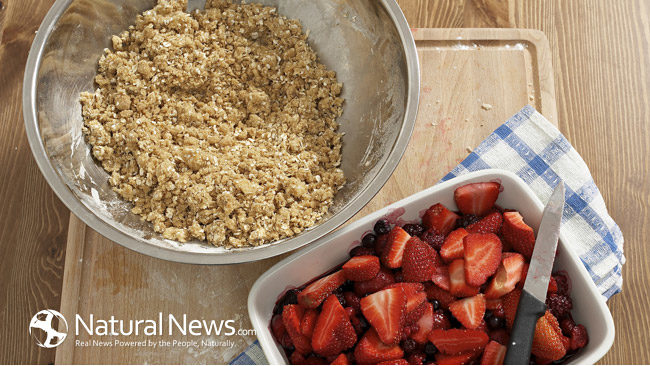Energy drinks are a convenient shortcut for many during a long day.
But the short-term boost they supply comes at a cost. When the effects of the hard caffeine hit have worn off, the ‘crash’ inevitably follows, leading to feelings of lethargy and fatigue.
What’s more, habitual consumption of these drinks has been found by WHO research to pose long-term health risks, such as increased insulin sensitivity and potentially type-2 diabetes. They can also aggravate digestive conditions such as IBS, by causing the gut to spasm and increasing discomfort and diarrhoea.
Still, many might see energy drinks as their only effective option when it comes to making it through a tough period at work. However, this isn’t the case.
In fact, making a handful of simple changes to what and how you eat can help you to overcome that mid-afternoon lull, and keep you powering through into the evening.
Here’s my guide to eating and drinking your way to naturally better energy levels:
Don’t Skip Breakfast
National surveys have shown that breakfast consumption over the past 50 years has been in a state of general decline, with fewer and fewer people eating a morning meal. One study estimated that the number of Americans skipping breakfast was around the 31 million mark.
But the notion that time spent eating breakfast is better spent in bed is a misguided one. Breakfast plays an integral role in getting the body ready for what’s to come, setting your metabolism in motion and providing you with the energy you need to take on the day.
Dairy, grains and fruits are the ideal choices as opposed to high-fat foods; so rather than calling in at your local diner for a round of bacon and waffles, stock up on items such as porridge, eggs and wholemeal bread at home.
Eat Regularly
It’s often said that breakfast is the most important meal of the day, but lunch and an evening meal are just as crucial. Skipping either will disrupt your metabolic rhythm, and cause energy levels to wane.
Make three meals per day your baseline, so that you aren’t tempted to reach for the cheat option (caffeine or a high fat snack) when your body starts asking questions halfway through the day.
Curb Added Sugar Intake
One diet habit sure to make your energy stores spike and then crash is the high sugar treat. Chocolate bars, candy and full-fat soda, however tempting they may be in times of need, are the major culprits.
If you’re eating three meals a day and enough fruit and vegetables, it’s likely that you’re getting a sufficient amount of sugar in your diet anyway; so try to jettison those items with added sugars as much as you can. Your body doesn’t need them. If you need something to nibble on at work, try a banana or a few slices of mandarin instead.
Get Some Starch
While you should be limiting anything with added sugar, another type of carbohydrate which is essential for maintaining a consistent flow of energy is starch.
Starchy foods such as potatoes, wholegrain rice, pasta and cereals release energy slowly as they digest, and help to sustain you over the course of the day. They’re also an important source of vitamins and fibre, which are crucial for vitality too. Foods of this type should account for around one third of your total food consumption.
Drink Plenty of Water
It is common for the body to feel tired and as though it needs more food, when in actuality what it needs is a glass of water.
Yes, you read that right: thirst is often confused with feelings of hunger, meaning that if you’re feeling the effects of the day despite having already eaten a good sized lunch or breakfast, you should probably think about how much water you have (or haven’t) drunk.
What’s more, mild dehydration has been found to have a significant impact on mood, as well as concentration.
The recommended minimum is eight glasses (or about two litres) per day. So, the next time you’re at the drink dispenser being tempted to opt for a caffeine-charged hit, try a H2O boost instead. It’ll help to restore your energy without the heavy after effects.
Dr Wayne Osborne has been working in general practice since 2002. His regular fields of practice tend to cover a wide range of areas, from paediatrics to elderly medicine. He serves as head practitioner at Treated.com, which provides a new and exciting, yet safe and secure way of delivering medical care to patients.
Sources:
Breda, J.J. et al. Energy drink consumption in Europe: a review of the risks, adverse health effects, and policy options to respond. Frontiers in Public Health. 2014. http://dx.doi.org/10.3389/fpubh.2014.00134
Osborne, W. and Read, N. IBS or Stomach Bug: What’s the Difference? 2016. https://www.treated.com/dr-wayne-osborne/ibs-or-stomach-bug-whats-the-difference
International Food Information Council Foundation. IFIC Review: Breakfast and Health.
http://www.foodinsight.org/Content/6/IFIC%20Brkfast%20Review%20FINAL.pdf
The NPD Group. 31 Million U.S. Consumers Skip Breakfast Each Day, Reports NPD https://www.npd.com/wps/portal/npd/us/news/press-releases/pr_111011b/
Armstrong, L.E. et al. Mild dehydration affects mood in healthy young women. 2012. http://www.ncbi.nlm.nih.gov/pubmed/22190027





